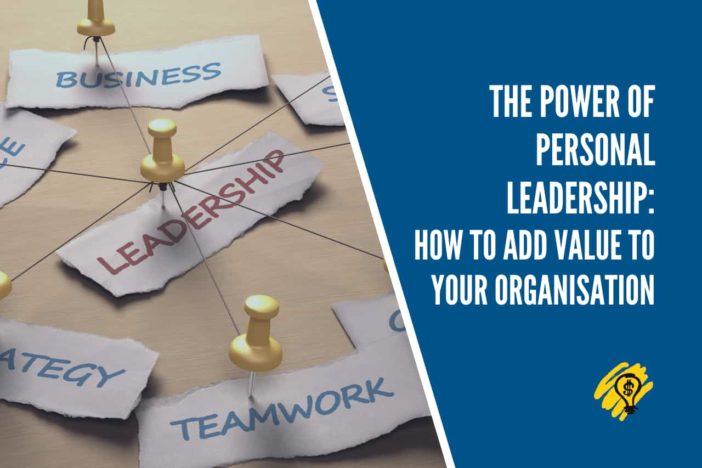Effective leaders add value to their organisation. In turn, they inspire, motivate, and encourage their team members to do the same. Today, we will discuss personal leadership and how leaders can apply it in their businesses and beyond.
If you’re interested in diving deeper into leadership topics such as this, consider registering for an executive leadership online course. These courses are designed to make you a better, more effective leader, which will have a positive ripple effect throughout the entire organisation.
You need the ability to influence others to follow your lead, to work with you, to support you, and to share in the achievement of your vision.
What is Personal Leadership?
Personal leadership is leading from the front and influencing others, even when not in a formal leadership position. It is about setting an example and demonstrating the behaviours that you expect from your team or organisation. In other words, it’s about leading by example. Then, when you are in a formal leadership position, you will already have the respect and trust of those around you.
How Can Leaders Add Value To Their Organisation?
There are many ways that leaders can add value to their organisation. Here are some of the most important:
Setting the vision and guiding the direction for the organisation, and then inspiring others to buy into that vision
This is the first and most crucial step that any leader can take. Without a clear vision, setting goals and achieving them is impossible. A leader’s job is to set the direction for the organisation and then inspire others to buy into that vision.
Building a strong team of motivated individuals
A leader’s ability to build a strong team is crucial to the success of any organisation. A team that is not only skilled but also motivated and committed can achieve great things.
With that in mind, here are some of our top team-building teams that can help motivate your team:
- Promote open communication: Leaders should encourage open communication between team members. This will help build trust and respect and allow team members to share ideas and solve problems more effectively.
- Encourage collaboration: Leaders should encourage team members to work together towards common goals. This will help to create a sense of unity and purpose within the team.
- Set clear goals: Leaders should set clear goals for the team and then ensure that everyone is aware of these goals. This will help to focus the team’s efforts and ensure everyone is working towards the same objectives.
- Offer support: Leaders should offer support to team members when they need it. This could include offering advice, listening to concerns, and providing resources.
- Recognise achievements: Leaders should recognise and praise team members for their accomplishments. This helps to motivate them and make them feel valued.
Creating a culture of innovation and creativity
Innovation and creativity are the lifeblood of your organisation. So, leaders must create an environment where new ideas are encouraged and celebrated. This helps the organisation stay ahead of the competition and continue to grow.
To create this culture, leaders need to be open to new ideas. They also need to create an environment where failure is seen as an opportunity to learn and grow.
Here are a few examples of how that might look:
- Encouraging team members to come up with new ideas and giving them the freedom to experiment
- Creating a process for collecting and reviewing feedback from customers and employees
- Encouraging transparency and open communication within the organisation.
Communicating effectively
Communication is the ticket to any leader’s success. Leaders need to communicate their vision and goals clearly, and then inspire others to buy into that vision. They must also be able to listen to feedback and use it to improve the organisation.
What Are Some Of The Challenges That Leaders Face?
We also know that leadership is not easy, regardless of the team you’re leading or your leadership style. It comes with its own unique set of challenges, which can be difficult to navigate. Here are some of the most common challenges that leaders face and how you might overcome them with the power of your personal leadership skills:
Resistance to change
People will always resist change, even when it is necessary. Leaders need to manage this resistance and convince those who are against change to see the benefits. You can do this with clear communication about the reasons for change and then providing support to help people through the transition.
Lack of engagement from employees
Disengaged employees can be challenging when it comes to getting them to buy into the organisation’s vision and goals. Therefore, leaders must find ways to engage their employees and get them excited about their work. This might involve setting clear expectations, providing feedback and recognition, and offering growth opportunities.
Ineffective communication
One of the most prevalent challenges that leaders face is ineffective communication. This can happen when leaders fail to communicate their vision or don’t listen to feedback from their team. It can also occur when there is a lack of transparency within the organisation. Leaders need to be aware of these communication challenges and find ways to overcome them.
What Are Some Of The Benefits Of Being A Leader?
Despite the challenges, many benefits come with being a leader. These benefits can include:
A sense of purpose and direction
Having a clear vision for your organisation gives you a sense of purpose and direction. This can be motivating for both you and your team.
The ability to make a difference
Leaders have the ability to make a real difference in the lives of their employees and the success of their organisation. This is one of the most rewarding aspects of leadership.
The opportunity to grow and develop
Leading an organisation allows you to grow and develop your own skills. It also allows you to help others grow and develop their skills.
A feeling of accomplishment
There is an incredible sense of accomplishment that comes with being a leader. When you see your team succeed, it can be a very satisfying feeling.
Continue Learning
Are you eager to learn more about being the best leader you can be? Then, explore the possibility of registering for an executive leadership online course where you can further cultivate your leadership skills.





